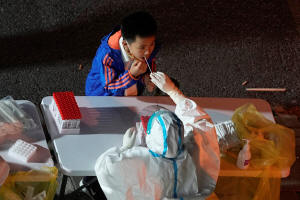China COVID cases rise, with city of Guangzhou on edge
 Send a link to a friend
Send a link to a friend
 [November 10, 2022]
BEIJING (Reuters) -China's COVID
outbreak continued to widen on Thursday, with new case numbers at their
highest since April and authorities in the hard-hit southern metropolis
of Guangzhou urging residents to work from home but stopping short of a
city-wide lockdown. [November 10, 2022]
BEIJING (Reuters) -China's COVID
outbreak continued to widen on Thursday, with new case numbers at their
highest since April and authorities in the hard-hit southern metropolis
of Guangzhou urging residents to work from home but stopping short of a
city-wide lockdown.
Rebounding COVID infections and China's aggressive response to them are
causing disruption for residents and businesses in cities across the
country and weighing on financial markets, including for global
commodities.
In Beijing, organisers of China's flagship auto show said the event,
already postponed, will not take place this year due to the COVID-19
situation in the capital, which reported 95 new infections for the
previous day, up from 80 a day earlier.
While China's infection numbers are low by global standards - new
domestic cases rose to 8,824 on Wednesday - the country continues to
stick with its outlier zero-COVID approach, fuelling widespread public
frustration and inflicting damage on the world's second-largest economy.

In Guangzhou, home to about 19 million people, cases hit more than 2,000
for a third straight day and officials have launched mass testing,
resisting for the time being a city-wide lockdown of the type that
paralysed Shanghai for two months earlier this year.
"As things stand, it is hard to tell whether Guangzhou will repeat the
experience of Shanghai in spring this year. If Guangzhou repeats what
Shanghai did in spring, it will lead to a new round of pessimism on
China," Nomura analysts wrote in a Thursday note.
Mason Long, who works for a Guangzhou gaming company, said some
residents are bracing for a lockdown, with many leaving the city or
planning to.
Most of Guangzhou's 11 districts are under some form of COVID
restriction.
"Panyu district just announced that it's restricting travel in and out,
so that's three districts to announce that," Long said. "The rest of us
in other districts are super worried this will be applied to the entire
city and we'll be facing a Shanghai-style lockdown."
Last week, Chinese share prices soared on hopes that China would begin
easing COVID curbs, but Beijing continues to reiterate its commitment to
what is a signature policy of President Xi Jinping that authorities
argue saves lives.
[to top of second column]
|

A boy gets tested for the coronavirus
disease (COVID-19) at a nucleic acid testing site, following the
coronavirus disease (COVID-19) outbreak in Shanghai, China, November
9, 2022. REUTERS/Aly Song
 China has yet to spell out an easing
strategy or mount the sort of massive new vaccine campaign that
experts say is needed before it can begin to open up, with many
saying China is unlikely to begin easing until the spring, at the
earliest.
BE MORE TARGETED
In Beijing, residents of some areas have been asked to get COVID
tests every day this week.
Outside one residential compound in the Chaoyang district, a
loud-hailer repeatedly squawked: "During this time of large-scale
testing, no one is to be left out. Do your COVID test each day."
A Thursday commentary in the official Xinhua news agency urged
Chinese authorities to take a more targeted approach to tackling
outbreaks and rectify any extra "layers" of measures.
"All localities will further improve the level of scientific and
precise prevention and control, strive to achieve the greatest
prevention and control effect at the least cost, and minimise the
impact of the epidemic on economic and social development," Xinhua
reported.
On Thursday, Taiwan-based Foxconn said it expected smartphone
revenue to fall this quarter and is adjusting production to prevent
recent COVID-19 curbs at at its massive Zhengzhou factory,which
makes Apple iPhones, from impacting holiday orders.
This month, Foxconn was rocked by discontent over stringent COVID
measures at the Zhengzhou plant, with many of its roughly 200,000
workers there fleeing the site.
Also on Thursday, automaker Haima Automobile said logistics and
personnel movements at its Zhengzhou base in central China had been
heavily affected by COVID-19 since October.
(Reporting by Bernard Orr and Ryan Woo in Beijing and Josh Ye in
Hong Kong; Writing by Tony Munroe; Editing by Robert Birsel and
Raissa Kasolowsky)
[© 2022 Thomson Reuters. All rights
reserved.] This material may not be published,
broadcast, rewritten or redistributed.
Thompson Reuters is solely responsible for this content.
 |